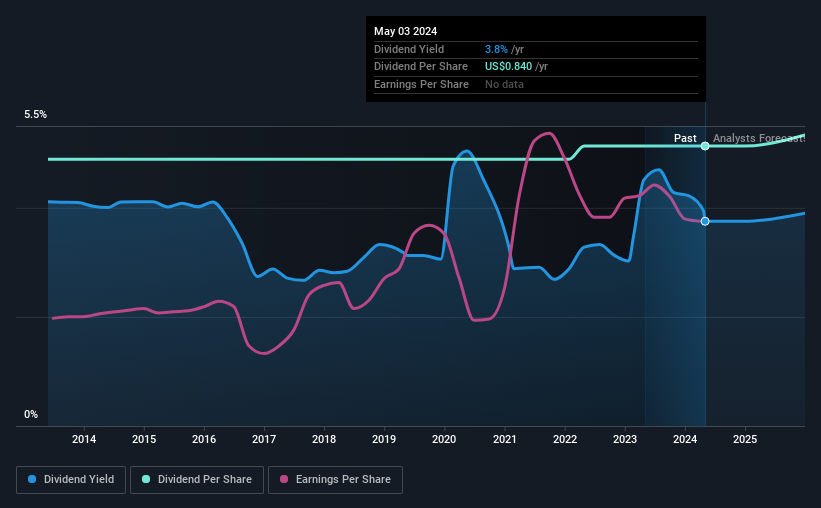Univest Financial Corporation (NASDAQ:UVSP) is about to trade ex-dividend in the next two days. The ex-dividend date occurs one day before the record date which is the day on which shareholders need to be on the company’s books in order to receive a dividend. The ex-dividend date is important as the process of settlement involves two full business days. So if you miss that date, you would not show up on the company’s books on the record date. This means that investors who purchase Univest Financial’s shares on or after the 7th of May will not receive the dividend, which will be paid on the 22nd of May.
The company’s next dividend payment will be US$0.21 per share, on the back of last year when the company paid a total of US$0.84 to shareholders. Last year’s total dividend payments show that Univest Financial has a trailing yield of 3.8% on the current share price of US$22.38. We love seeing companies pay a dividend, but it’s also important to be sure that laying the golden eggs isn’t going to kill our golden goose! As a result, readers should always check whether Univest Financial has been able to grow its dividends, or if the dividend might be cut.
See our latest analysis for Univest Financial
If a company pays out more in dividends than it earned, then the dividend might become unsustainable – hardly an ideal situation. That’s why it’s good to see Univest Financial paying out a modest 35% of its earnings.
When a company paid out less in dividends than it earned in profit, this generally suggests its dividend is affordable. The lower the % of its profit that it pays out, the greater the margin of safety for the dividend if the business enters a downturn.
Click here to see the company’s payout ratio, plus analyst estimates of its future dividends.
Have Earnings And Dividends Been Growing?
Businesses with strong growth prospects usually make the best dividend payers, because it’s easier to grow dividends when earnings per share are improving. Investors love dividends, so if earnings fall and the dividend is reduced, expect a stock to be sold off heavily at the same time. With that in mind, we’re encouraged by the steady growth at Univest Financial, with earnings per share up 6.9% on average over the last five years.
Another key way to measure a company’s dividend prospects is by measuring its historical rate of dividend growth. Univest Financial’s dividend payments are broadly unchanged compared to where they were 10 years ago.
Final Takeaway
From a dividend perspective, should investors buy or avoid Univest Financial? Univest Financial has seen its earnings per share grow slowly in recent years, and the company reinvests more than half of its profits in the business, which generally bodes well for its future prospects. We think this is a pretty attractive combination, and would be interested in investigating Univest Financial more closely.
While it’s tempting to invest in Univest Financial for the dividends alone, you should always be mindful of the risks involved. For example – Univest Financial has 1 warning sign we think you should be aware of.
If you’re in the market for strong dividend payers, we recommend checking our selection of top dividend stocks.
Have feedback on this article? Concerned about the content? Get in touch with us directly. Alternatively, email editorial-team (at) simplywallst.com.
This article by Simply Wall St is general in nature. We provide commentary based on historical data and analyst forecasts only using an unbiased methodology and our articles are not intended to be financial advice. It does not constitute a recommendation to buy or sell any stock, and does not take account of your objectives, or your financial situation. We aim to bring you long-term focused analysis driven by fundamental data. Note that our analysis may not factor in the latest price-sensitive company announcements or qualitative material. Simply Wall St has no position in any stocks mentioned.








